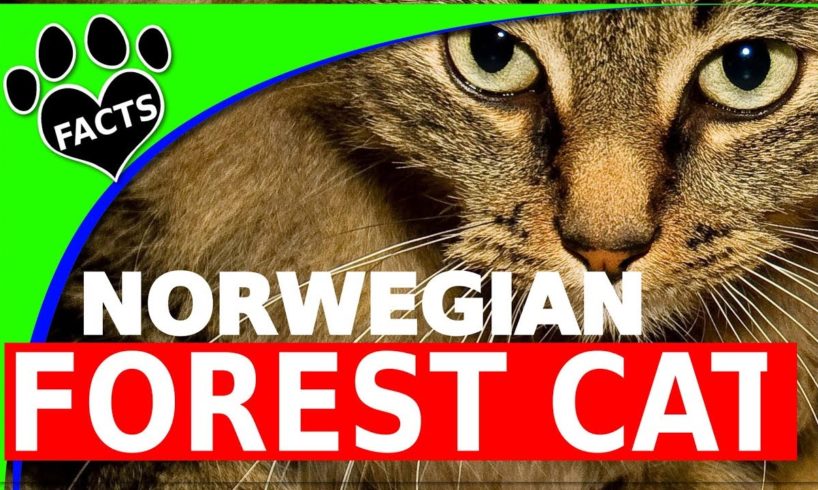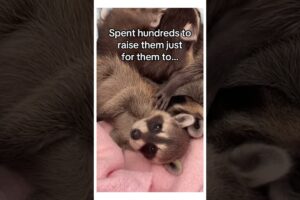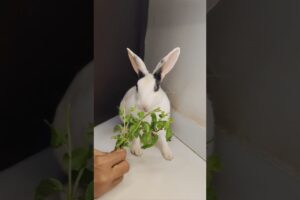
10 Interesting Facts About the Norwegian Forest Cat Cats 101 Norsk Skogkatt
Check out this Channel:
Jade and Pearl – Norwegian Forest Cat’s
https://www.youtube.com/channel/UC-ljrCincPhBjS02SNXzTyQ
Our Official Website – http://www.animalfacts.us
Viking Norwegian Forest Cat Art Men’s O-neck T Shirts
http://www.animalfacts.us/viking-cat
Norwegian Forest Cats and Kittens Care, Nutrition, Behavior, Personality, Health, Training, Breeders and more
http://www.animalfacts.us/norwegian-forest-cat-book
The Norwegian Forest cat (Norwegian: Norsk skogkatt or Norsk skaukatt) is a breed of domestic cat originating in Northern Europe. This natural breed is adapted to a very cold climate, with a top coat of glossy, long, water-shedding hairs and a wooly undercoat for insulation. Although this is uncertain, the breed’s ancestors may have been a landrace of short-haired cats brought to Norway by the Vikings around 1000 AD, who may also have brought with them long-haired cats, like those ancestral to the modern Siberian and Turkish Angora breeds. During World War II, the breed became nearly extinct until efforts by the Norwegian Forest Cat Club helped the breed by creating an official breeding program. It was registered as a breed with the European Fédération Internationale Féline in the 1970s, when a local cat fancier, Carl-Fredrik Nordane, took notice of the breed and made efforts to register it. Currently, the Norwegian Forest breed is very popular in Norway, Sweden, Iceland, and France.
It is a big, strong cat, similar to the Maine Coon breed, with long legs, a bushy tail, and a sturdy body. The breed is very good at climbing since they have strong claws. The lifespan is usually 14 to 16 years, though kidney and heart diseases have been reported in the breed. Specifically, in this breed, complex rearrangements of glycogen branching enzyme (GBE1) can cause a perinatal hypoglycemic collapse and a late-juvenile-onset neuromuscular degeneration in glycogen storage disease type IV.
The Norwegian Forest cat is adapted to survive Norway’s cold weather.[1][2] Its ancestors may include black and white shorthair cats brought to Norway from Great Britain some time after 1000 AD by the Vikings, and longhaired cats brought to Norway by Crusaders. These cats could have reproduced with farm and feral stock and may have eventually evolved into the modern-day Norwegian Forest breed.[3][4][5] The Siberian and the Turkish Angora, longhaired cats from Russia and Turkey, respectively, are also possible ancestors of the breed.[3] Norse legends refer to the skogkatt as a “mountain-dwelling fairy cat with an ability to climb sheer rock faces that other cats could not manage.”[6] Since the Norwegian Forest cat is a very adept climber,[7] author Claire Bessant believes that the skogkatt folktale could be about the ancestor of the modern Norwegian Forest breed.[6] The name Norse skogkatt is used by some breeder and fancier organisations for the modern breed.
Most likely the ancestors of the Norwegian Forest cat served as ships’ cats (mousers) on Viking ships.[8] The original landrace lived in the Norwegian forests for many centuries, but were later prized for their hunting skills and were used on Norwegian farms,[9] until they were discovered in the early twentieth century by cat enthusiasts.[10]
In 1938 the first organisation devoted to the breed, the Norwegian Forest Cat Club, was formed in Oslo, Norway.[11] The club’s movement to preserve the breed was interrupted by World War II. Owing to cross-breeding with free-ranging domestic cats during the war, the Norwegian Forest cat became endangered and nearly extinct until the Norwegian Forest Cat Club helped the breed make a comeback by developing an official breeding program.[12][13][verification needed] Since the cat did not leave Norway until the 1970s, it was not registered as a breed in the Fédération Internationale Féline (FIFe), the pan-European federation of cat registries, until Carl-Fredrik Nordane, a Norwegian cat fancier, took notice of the breed, and made efforts to register it.[11] The breed was registered in Europe by the 1970s, and in the American Cat Fanciers Association in 1994. In 1978, it was recognized in Sweden,[15][clarification needed] and in 1989, they were accepted as a breed in the United Kingdom by the Norwegian Cat Club of Britain.
The Norwegian Forest breed is very popular in Norway and Sweden. Since 2003, it has been the fifth most popular cat breed in France, where there are about 400 to 500 births per year.[
source







Why not come join our Facebook Group?
https://www.facebook.com/groups/1381407291871706/
Or follow our Facebook page?
https://www.facebook.com/animalfactsus/
We have a female that I was told was a Maine Coon, but she seems to be more like a Weegie. She's about 12lbs and loves to climb the bushes and our neighbors fence. We live in NH and she loves going outside year round. She wants out as I type this and it's in the 30's and has been snowing.
These big Bois are one of the most powerful domesticated cats and extremely ballsy. Even known to attack bears, run up SOLID STONE and litteraly crush the skull of mice in a single bwap. That said, they still do mlems.
I have a purebred one named misty! She’s so cute
The vet set he was half
Of a nortwegain cat
We found a kitten along the side of the road and as he grew, I'm thinking he may have some Noregian Forest cat in him. He's friendly and always plays with our dog who is part husky and German Shepard when she gets rough. He just doesn't care
The Norwegian Forest Cat is probably the closest you can go if you want a tiny lion, just look at that maine! And since they hail from Norway, they probably meow in the viking language :p
Watching this with two little Wegie sisters on my lap heh
Ohh my…there's my kitty at 4:22…she's is a kitten still but pretty much same color and appearance…so glad to know she's gonna look this beautiful in some months?
I have one that is grey and white, his name is ernie. He is the sweetest cat ever!!!! He follows me around like a dog and loves to nudge my nose.
What a wonderful (and cute!) video! Well researched, and entertaining. Information matches up with everything else I've seen about them so far.
I've been trying to identify my kitty for years now! Got him as a kitten off the street, thought someone was missing him terribly in the minus 40C weather but no one claimed him. He's a polydactyl with 24 toes, used to think he was a maincoone but looking at skull shape I'd definitely say he's more like a Nowegian Forest! His behaviour is very similar to all I read on them, but I'm still unsure. If anyone can help, my instagram is melda_arwen and I post a lot of pictures of my kitties that you might be able to help identify what breed he is?
I also have two for sure mixes, no idea what lineage those two could have as they both certainly have farmcat roots! But this guy I talked about above, he is a little different.
I had a female. She was a BEAUTIFUL kitty, but she was only about 6 lbs
it's pronounced sk-oh-gh-k-ah-t
NOW I WANT ONE T~T
I just adopted one! She was about 6 weeks old when I found her, I’m pretty sure her parents left her behind when they moved 🙁 her name is Fluff! She’s very shy, cuddly and active!
He has kidney problems
Mine gets very moody
My cat is half Norwegian
i always play hide and seek with my cat
I have one of these, she has CH which is a disability, but she does not know that she is limited. she is the queen of our house.
Its pronounced "skoh cat"
I had a black female called Djingo❤
I kept one of her daughters and called her Diva❤
My friend has a norwegian forest cat is soooo cutee
SImpy the most beautiful cat in the EU.
I have a skogs Cat i liv in norway
I have 2 Norwegian forest cats. Panda is black and white and milo is grey and white striped
I adopted a kitten who turned out to be a NFC. Hes gorgeous and so lovey ??? I love his big feeties and floofy tail
It's one of the most common cat breeds in my country [SWE]
You get an A++++++ for the video & A++++++++++++++++++++++++ for being an awesome Dad!
I have a black and white Norwegian forest cat her name is Bella 🙂
I had two of these, and the most amazing thing about them was how much they LOVED invading my bath time!
Some cats either never enjoy getting wet, or at least needs to be trained to endure it, but these little furballs practicly started joining me in the shower from the first day i got them! I normally never closed the door with my other cats, as they would just sit there and look at what i was doing. But my NFCs just waltzed right in there, DEMANDING i let them shower too…
I eventually started bathing them in the sink, as they would often sleep there, and when i wanted to have some fun with them, i opened the tab, letting the sink fill. They didn't care, and the fur didn't allow the water to drain, so they would just stay there, only moving when they were about to drown, so i decided that this would be the perfect oppertunities to give them a bath once in a while!
my norwegian forest cat hates other animals
I have a norwegian forrest cat and a bombay cat
One of the most hateful, nasty cat breeds there is. We have one, and will not let us pet him or touch him. He hides 24/7. This cat needs to be in the wild…hates humans. I am going to let mine go without hesitation.
We have black cat mix and a Tortie ^^ Would love to watch a video on Russian Blue cats
Most descriptions, photos, and videos on the Norwegian Forest Cat are garbage. This video is very good with only minor errors. One error is that in the US they are sometimes called wegies, as in "Wee Jeez," not wedgies as in uncomfortable underwear. 😉
I was amazed that almost every cat in the video is a Norwegian! You don't know how rare this is. This cute little girl "Norway" appears twice: https://www.youtube.com/channel/UCGCbFzDqkiYxmh6K_oZW__g
Another error is at 5:02 where some Siberians appear. The two in front are Altai and Barnaul owned by Alla Lebedeva of Russia. I can't blame Leroy and Rosie since photos of these two cats are ALWAYS mislabelled as Norwegian Forest Cats. Alla might send you kisses if you get their photo and this caption to go viral. "Altai and Barnaul are Siberians NOT Norwegian Forest Cats!"
As a breeder of 20 years of these majestic animals I am very pleased that the information with this video is 100 percent correct! Well done. Lovely video
I have a boy one
And his name Melo
We have had 7 of these cats (im norwegian ) now we have two of them left, best cats ever
Like my fat brother ?
I'm saying hey norweigan forest cat :))
"The goddess of love an beauty" love how you leave out that last part, her primary domain was DEATH. She was the goddess of the valkyrie (which were in a sort angles of death, or "reapers".) Beauty and fertility we her secondaries.
Cute video. I love my kitty very much.
We have a 31 lbs NFC.. found him as a kitten under a bush abandoned and he grew into this giant cat…hes my Gizmo
I have 3 Norwegian Forest cats
A neighbor took one of these cats in after seeing it wandering around the neighborhood for 3 years. She's very loving, very fluffy and quite sick, I hope she recovers soon..
I have an all black one. He just showed up on our doorstep one day. He couldn't have been more than 10weeks old. I thought my boxer would scare him but nope. He walked right in attacked my dog and ate his food. Jumped on to the couch and fell asleep. We have had him for 4 years now and is the coolest cat.